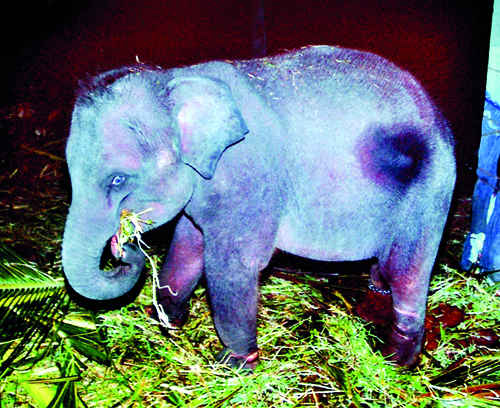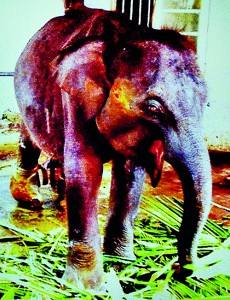News
Cry halt to jumbo captures, say concerned activists
An elephantine problem in Sri Lanka, involving the illegal capture of baby elephants from the wild, reached crisis-point with environmentalists meeting at a Colombo hotel yesterday to discuss measures to halt such captures.
Baby elephants are isolated from their herds in the jungle, captured and transferred to different locations for sale for anything between, Rs. 10 million to Rs. 15 million each, said environmental activists Vimukthi Weeratunga and Nadika Hapuarachchi in a heart-rending presentation titled ‘Innocent freedom to a captive hell’.

"Baby elephant taken into custody by the DWC on February 28, this year, from a home in Mirigama. The mark on the rump of the baby indicates that it has been tranquillised, activists allege. Pic courtesy of Wildlife Conservation Society, Galle.
These two crusaders, with a few others, who have been doggedly fighting to stop baby elephant captures from the wild, even facing risk to their own life and limbs, highlighted the magnitude and the modus operandi of the racketeers involved.
At least 200 baby elephants have been captured from the wild in the past several years, environmentalists say. They allege that baby elephant captures from the wild are being carried out by jumbo racketeers, with important people’s names being implicated and serious allegations of non-action against top Department of Wildlife Conservation (DWC) officials.
The issue exploded on Thursday when a baby elephant was taken into custody by the DWC from a house in Gannoruwa, Peradeniya. The baby recovered by DWC’s Western Province Assistant Director U. Indrajith was produced before Kandy Additional Magistrate Srinath Wijesekera on Friday, with court ordering that it be sent to the Elephant Transit Home at Uda Walawe. Two people have been remanded till May 20 in this connection and instructions issued that the baby elephant’s age be ascertained.
“Babies caught from the wild are sold after obtaining a registration document,” alleged Mr. Weeratunga yesterday, stressing that the law is crystal clear.

A baby in bad shape taken into custody by the DWC from a home in Maharagama on March 14. Pic courtesy of Media Unit of the Wildlife Conservation Ministry
Citing the Fauna and Flora Protection (Amendment) Act, No. 22 of 2009, he told the discussion organised by the Federation of Environmental Organisations that no person can illegally capture and keep an elephant. The Registration and Licensing of Tusker and Elephant Regulation 1991 only outlined the process of domestic elephant regulations. It is applicable only to elephants that are already registered and babies that are born to captive elephants. (See box for the law)
It was revealed at the discussion that there are 213 captive elephants for which the DWC have issued permits, which have to be renewed every year. Of these captive elephants, 94 are at the Dehiwela National Zoological Gardens and at the Pinnawela Elephant Orphanage.
Explaining how jumbo babies are caught, Mr. Hapuarachchi said it is suspected that permits are illegally sought prior to the illegal capture of babies from the wild to avoid getting entangled with the law when transporting them. “There are elephants with permits and permits without elephants,” he said.
When taking into consideration elephants with permits, most owners claim that the mother of the baby elephant died at birth in order to receive permits for illegally-acquired babies, he said, adding, “Officials are scared to take action because big names are involved.”
Underscoring that it is a double tragedy for wild elephants, Mr. Weeratunga, meanwhile, told the Sunday Times that the baby’s mother is shot and killed by the ‘elephant catchers’ who then bring the baby long distances after tranquillising it. If the baby gets aggressive when it wakes up, as it would due to the trauma it has undergone, it is either violently beaten into submission or tied up so tightly that it suffers serious injury, often resulting in the baby’s death.
“It is big business,” added Mr. Hapuarachchi, with wildlife activists suspecting that baby elephant captures from the wild, occur mainly from Habarana, Kalawewa, the eastern border of Uda Walawe which encompasses Tanamalwila, Wellawaya, etc.
There are also serious allegations being levelled against some veterinary surgeons who treat captive elephants, in that they certify that babies have been born to non-existent cow elephants.
The Sunday Times learns that the latest target of these jumbo racketeers seem to be the baby elephants released into the wild from the

Vimukthi Weeratunga at the meeting held by environmentalists in Colombo. Pic by Mangala Weerasekera
Elephant Transit Home at Uda Walawe. These babies are easy ‘prey’ as they are not afraid of humans. Not only are there fears that they are captured by these unscrupulous people after they are sent back into the jungles, but that they are also subjected to untold suffering as the microchips inserted by the DWC to track them in the wild are gouged out to prevent detection, sources said.
The baby elephant fiasco has been peppered with irony – with captive elephants mandatorily needing a permit and the permit having to be renewed every year, the ‘Registration Book’ maintained at the DWC suddenly went missing around August last year.
Another serious issue is the allegation by a former Director-General of Wildlife as recently as last month that the signature on two of the ‘Certificates of Registration of a Tusker or Elephant’ apparently issued during his time was forged. The reality though is clear – baby elephants being caught from the wild must stop and stop right now, urge these animal rights activists.
| Solution to check racket
Here are activist Nadika Hapuarachchi’s suggestions to solve this problem:
The law as it stands There is absolutely no ambiguity in the Fauna and Flora Protection (Amendment) Act, No. 22 of 2009. |

